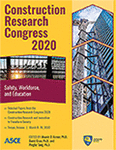Construction Research Congress 2020
Assessing Worker Health and Well-Being in Construction: Case of Seattle
Publication: Construction Research Congress 2020: Safety, Workforce, and Education
ABSTRACT
Increase in chronic diseases amongst the U.S. workforce results in reduced productivity and increased medical care costs. The shortage of manpower against the growing demand has also forced many workers to work overtime multiple days a week. It is therefore important to study and understand a worker’s health holistically, considering not only physical health but also mental health, work-life balance, stress, and safety. Total worker health takes factors relating to geography, industry, workload, family, travel time, etc. into consideration and thus, is a comprehensive approach to interpret worker health and well-being. This paper aims to study the total worker health of the people employed in the construction industry. An anonymous survey was conducted with worker participants from various construction trades in Seattle, the crane capital of America in 2018. Analysis of the survey results highlighted aspects that could impact total worker health in construction. One of our findings indicated that workers who put in the most physical effort had trouble sleeping at night. The physical demand and pace of work also seemed to be the contributing factors to troubled sleep. Age of the workers was found to play an important role in the commuting patterns and one’s ability to maintain a work-life balance. We consider this preliminary understanding of the important aspects key to designing sensible measurements (e.g., well-being index) as well as strategic interventions to promote the well-being of construction workers and facilitate a positive work environment for the industry.
Get full access to this article
View all available purchase options and get full access to this chapter.
REFERENCES
Mahalik, J. R., and Backus Dagirmanjian, F. R. (2018). “Working Men’s Constructions of Visiting the Doctor”, American Journal of Men’s Health, 12(5), 1582-1592.
Netemeyer, R., Boles, J., and McMurrian, R. (1996), “Development and Validation of Work-Family Conflict and Family-Work Conflict Scales”, Journal of Applied Psychology. Vol. 81 (4), pp. 400 – 410.
NIOSH (2012). Research Compendium: The NIOSH Total Worker HealthTM Program: Seminal Research Papers 2012. Washington, DC: U.S. Department of Health and Human Services, Public Health Service, Centers for Disease Control and Prevention, National Institute for Occupational Safety and Health, DHHS (NIOSH) Publication No. 2012-146, 2012 May. Pp. 74-76.
NIOSH (2015). Issues Relevant to Advancing Worker Well-being Through Total Worker Health: https://www.cdc.gov/niosh/twh/pdfs/TWH-Issues-4x3_10282015_final.pdf
Rosenberg, M. (2019, January 16). Seattle still has the most cranes in America, and construction isn’t losing much steam. Retrieved from The Seattle Times: https://www.seattletimes.com/business/real-estate/seattle-still-has-the-most-cranes-in-america-and-construction-isnt-losing-much-steam/
Schwatka, N. V., Butler, L. M., & Rosecrance, J. R.(2012, January). An Aging Workforce and Injury in the Construction Industry. Retrieved from CPWR: https://www.cpwr.com/sites/default/files/publications/RosecranceAgingWorkforceKF.pdf
Silva, N. (2014), “The Behavioral Risk Factor Surveillance System”, the International Journal of Aging and Human Development, 2014, Vol 79(4), pp. 336-338.
Sorensen, G., Sparer-Fine, E., Williams, J., Gundersen, D., Boden, L., Dennerlein, J., Hashimoto, D., Katz, J., Mclellan, D., Okechukwu, C., Pronk, N., Revette, A., and Wagner, G. (2018). “Measuring Best Practices for Workplace Safety, Health, and Well-Being: The Workplace Integrated Safety and Health Assessment”. Journal of Occupational and Environmental Medicine. 60. 1.
Information & Authors
Information
Published In
Construction Research Congress 2020: Safety, Workforce, and Education
Pages: 336 - 345
Editors: Mounir El Asmar, Ph.D., Arizona State University, David Grau, Ph.D., Arizona State University, and Pingbo Tang, Ph.D., Arizona State University
ISBN (Online): 978-0-7844-8287-2
Copyright
© 2020 American Society of Civil Engineers.
History
Published online: Nov 9, 2020
Published in print: Nov 9, 2020
Authors
Metrics & Citations
Metrics
Citations
Download citation
If you have the appropriate software installed, you can download article citation data to the citation manager of your choice. Simply select your manager software from the list below and click Download.
